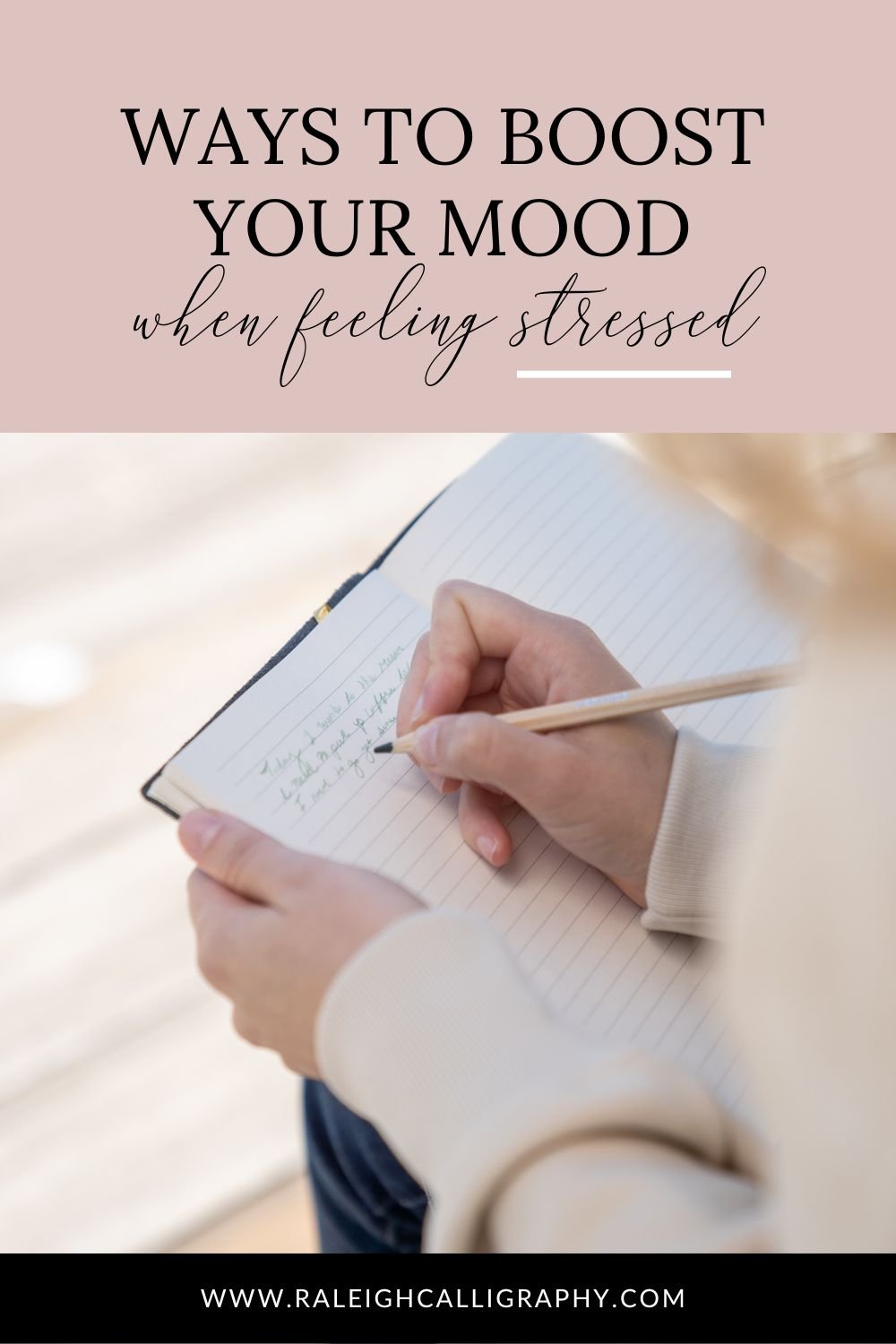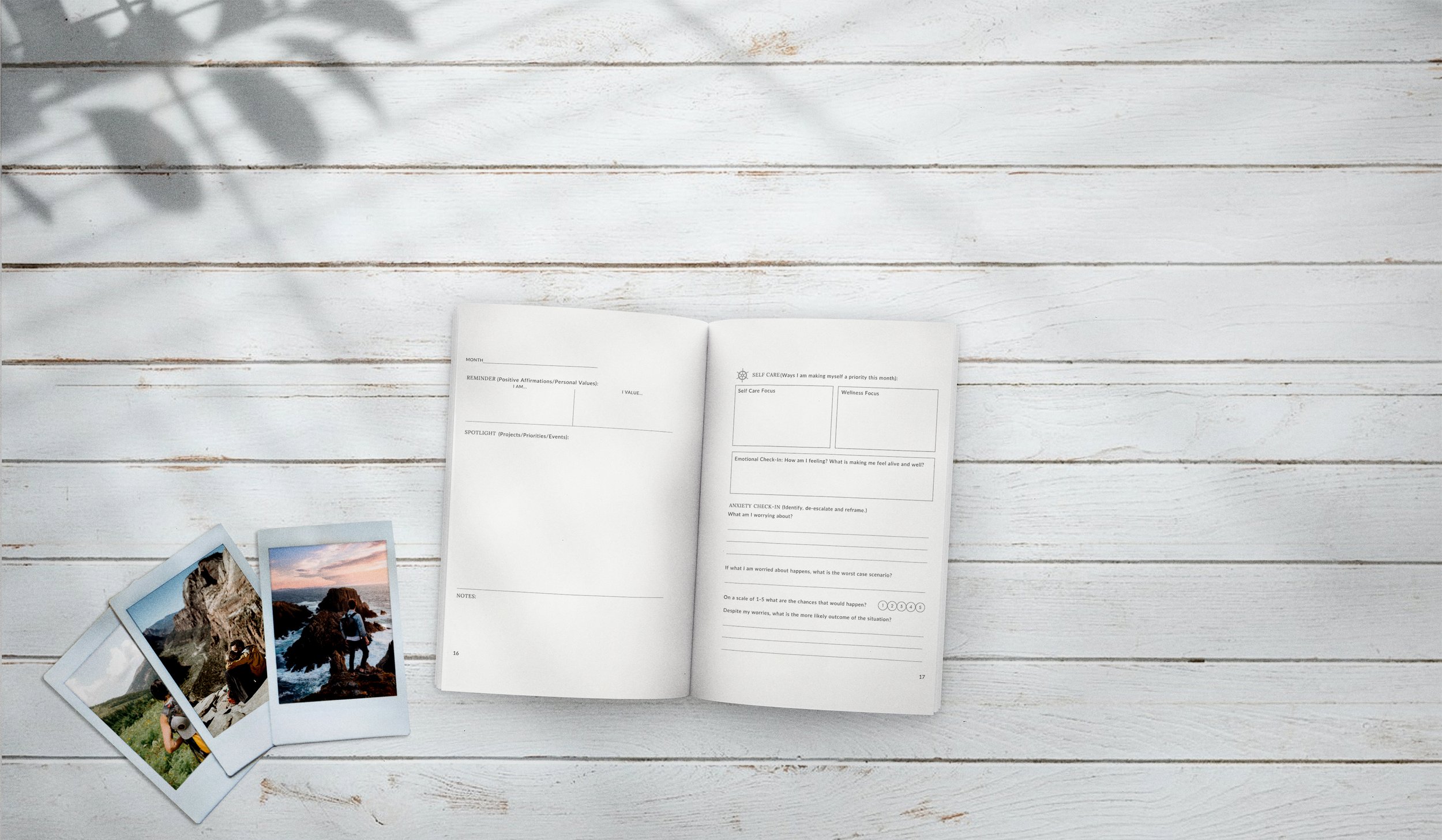Shift Your Mindset, Change Your Mood:
Ways to improve your mood when stressed, anxious or overwhelmed.
Stress and Mood
Being stressed, anxious or overwhelmed can have a big impact on our mood.
When I notice I'm getting upset because I'm worried about something, I turn my focus to journaling and can almost always see an improvement in my mood right after.
A Letter to the Overwhelmed
At the front of the Helm Planner is a short letter that I felt was important to include. If you’re new to my page, you can read more about the life planner and look inside it here. Anyway, here’s what it says:
“Dear Reader, Everyday may not be a good day. That’s okay. This planner aims to help you find joy without being overly pushy; and shares genuine optimism without the toxic positivity. Because no one can be happy ALL the time. That’s okay, too. All emotions are valid and part of the human experience.”
It then goes on, to say it’s okay to… make mistakes, be less than perfect, have a bad day, not be okay all the time, say NO without giving a reason, slow down, put yourself first and be yourself.
Shifting Your Mindset
It’s normal if you sometimes find yourself in a bad mood when things aren’t going so well. It’s also perfectly normal if you feel grouchy sometimes, even when life is going peachy. Just remember, a bad day doesn’t mean a bad life.
If we dwell on the negatives, we’re likely going to feel worse. Instead, there are a number of simple and easy ways that can help change our mindset when we find ourselves in a bad mood, especially when we’re stressed.
For me, I find that in addition to journaling, going outside or changing your scenery can drastically improve my mood. But what works for others?
I Asked an Expert
I recently connected with Dr. Kelly Kessler, PT, DPT, MS, CSCS, owner of Optimal You Health and Wellness LLC, and the host of the Rewiring Health Podcast. She was kind enough to review the Helm Planner and share her feedback. (Spoiler: she liked it! Her review is below.)
Hoping for some insight on ways Dr. Kessler helps her clients change their lives and improve their mindsets, I asked Dr. Kessler her thoughts on the best ways to improve one’s mood.
To my delight, she very kindly agreed to share her insights and tips. Below are her thoughtful responses to my questions. Enjoy!
An Interview with Dr. Kelly Kessler on Mood and Stress
Question: Before we dive in to the main question of ways to improve mood, can you tell us about the type of work you do?
Dr. Kessler: “I help individuals achieve relief from chronic pain following an eating disorder. This is a deep-seeded mission for me as I finally overcame chronic back pain once I realized the impacts an eating disorder I lived with had on my nervous system.”
Question: And are you accepting new clients?
Dr. Kessler: “Yes, I am currently accepting new clients into my signature program Eating Disorder Pain Solutions. This is the refined version of the roadmap I used as well as my clients to go from unrelenting pain to enjoying freedom within my body and enjoying life.”
Question: How should people contact you?
Dr. Kessler: The best way to contact me is either through email (info@optimalyouhealthandwellness.com) or send me a message on social media @drkellykessler on Instagram, Facebook, YouTube and Tik Tok.
Ways to improve your mood when feeling stressed
Question: Okay, let’s talk about mood and stress. What is the main thing you tell overwhelmed clients to do to change their mindset when they find themselves in a bad mood?
Dr. Kessler: “When you are experiencing a mood that holding you back, it can be really challenging to change your mindset with thought alone. I recommend taking action and going through the body which has a profound effect on your brain. Focussing on breath such as inhaling for a count of 4 seconds, holding the breath for 7 seconds, then exhaling for 8 seconds is a great tool for shifting internal states. Then, focusing on one thing you are grateful for (no matter how small) will continue to shift the brain into a state that serves you to move forward.”
Question: What are some other things that can improve your mood?
Early Sunlight Exposure
Dr. Kessler: “Getting outside to view the morning rays for 5-10 minutes, obviously not directly, has several benefits. One is that it sets circadian rhythms making it easier to get to sleep at night. It also increases cortisol levels early in the day which increases alertness and wakefulness. Additionally, it also impacts dopamine levels which are beneficial for increased motivation to be more productive.”
15 Minutes of Movement
Dr. Kessler: “Movement is beneficial throughout the day, but ideally it is best to do it early in the day. Early movement increases core body temperature which increases alertness throughout the day. Physical activity also increases nervous system resilience, which improves your ability to buffer stress. Additionally, movement promotes the release of endorphins (boosts mood) and serotonin (feel-good neurotransmitters).”
Breathwork
Dr. Kessler: “Conscious awareness of breath and breath practice have a profound ability to shift your nervous systems from fight or flight stress response (sympathetic nervous system) to rest, digest, restore response (parasympathetic nervous system). This tool is beneficial to do throughout the day and is great to buffer stress. There are many breath practices, but a great place to start is inhaling for a count of 4 seconds and exhaling for a count or 8 seconds then repeating.”
Writing Three Statements of Gratitude in the Morning
Dr. Kessler: “Your brain is set up to see more negatives in yourself, the world, and situations. It is wired this way as a protective mechanism from primitive times. However, this does not serve us as well in today’s world. Taking moments to shift your focus to what you are grateful for promotes new pathways in the brain and allows you to see more positives. Once you set this intention, you will more readily see more things you are grateful for. It’s like buying a new car and seeing them all over after you do. You instruct your brain in how to filter the world.”
Journaling to Reframe Your Thoughts
Question: When someone is feeling anxious about an upcoming event or task, is it helpful to identify the worry and try to reframe it in terms of likely outcome, rather than fixating on worst case scenarios?
Dr. Kessler: “Our subconscious brain plays a profound role in how we filter out the world and our perceptions of self. Often we are unaware of the internal messaging that is going on in the background even though it dictates 95% of our lives. Journaling can be a great way to bring these stories we tell ourselves into conscious awareness. This awareness then allows us to question if these stories are true. For example, maybe you are a people-pleaser and it holds a lot of power in your personal relationships. However, what if this is just a subconscious story you are telling yourself that others' needs matter more than your own and what if that is not true. How would your life look different if you stopped believing this. This is why journaling can be so powerful in moving your life forward.”'
Dr. Kessler’s thoughts on the Helm Planner:
“I had the wonderful opportunity to use the Helm Planner and it is an amazing tool for anyone who struggles with stress/anxiety/overwhelm. It is easy to use and covers so many important aspects of life. There is so much benefit to putting thoughts on paper instead of letting them fester in our heads and this planner has insightful prompts throughout. I really enjoyed the relaxation exercises that are included as well.” - Dr. Kelly Kessler, PT, DPT, MS, CSCS
Want more great content on Mental Wellness? Then be sure to follow Dr. Kelly Kessler on Instagram, listen to the latest episode of her podcast or head over to her website to learn more about her practice.
Instagram: @drkellykessler | Podcast: Rewiring Health Podcast
Website: Optimal You Health and Wellness LLC
Meet Dr. Kessler
Bio: Dr. Kelly Kessler is a licensed physical therapist, wellness coach, host of the podcast Rewiring Health, and the owner of Optimal You Health and Wellness, LLC. Kelly teaches women who have a history of an eating disorder how to regulate their nervous system to achieve relief from chronic pain through her signature method, Eating Disorder Pain Solutions. Inspired by her own journey of recovering from an eating disorder and chronic back pain, Kelly has helped many women harness their profound ability to shift from survival mode to thriving. Kelly uses an integrative approach to healing including a personalized audit, education, community support, and actionable steps to create long-lasting results.






